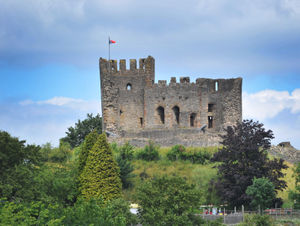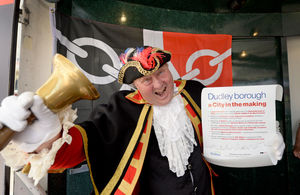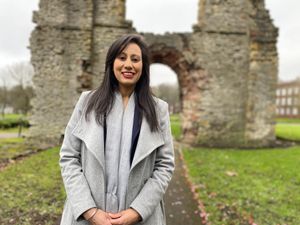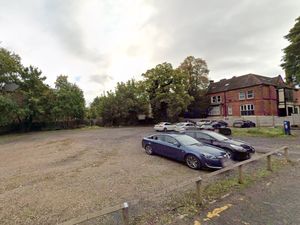Disappointment as Dudley misses out on city status
Dudley's aspirations to become a city have been crushed as the borough learned it was unsuccessful in its bid.

The borough has missed out on city status after eight places across the country and overseas won a coveted city status as part of celebrations for the Queen's Platinum Jubilee.
Stanley in the Falklands Islands is the first Overseas Territory to win the competition for city status, while Douglas in the Crown Dependency of the Isle of Man has also claimed the civic honour.
The Cabinet Office said that Bangor in Northern Ireland, along with Colchester, Doncaster and Milton Keynes in England, plus Dunfermline in Scotland and Wrexham in Wales have also won the honour.
Dudley had announced its bid on Black Country Day on July 14 last year, with Halesowen also holding a big event on the day to celebrate the bid.

Dudley Council Leader Councillor Patrick Harley said he and the rest of the council were disappointed to miss out, alongside other parts of the Midlands.
He said: "We're extremely disappointed and I don't think we could have made the bid any better than it was.
"I think that, this time around, we were up against so many other places that entered a bid to become a city and the odds were really stacked against us.
"However, the team couldn't have done any more and I am extremely proud of the bid as what they put together was a first class bid which we didn't need to spend a lot of money on.
"I do note a disappointment that there were no Midlands towns included in the final stage, but we will certainly apply again and look to enter when the next anniversary comes up."
The Chancellor of the Duchy of Lancaster Steve Barclay said: "What was clear to me during the process of assessing each application was the pride that people felt for their communities, local cultural heritage and the Royal Family.
"As we celebrate Her Majesty The Queen's colossal contribution to society, I am thrilled that we are able to recognise some of the many places that make Britain great.
"It is also incredibly reflective of Her Majesty's global outlook and years of international service that applicants from the Overseas Territories and Crown Dependencies have been selected as winners for the first time."
The announcement of the Queen’s Diamond Jubilee civic honours brings the number of official cities in the mainland UK to 76, with 55 in England, eight in Scotland, seven in Wales and six in Northern Ireland.
Of the six new cities across the UK mainland, the largest is Milton Keynes in Buckinghamshire, which had a population at the 2011 census of 171,750. The next largest is Colchester in Essex (population: 119,441), followed by Doncaster in South Yorkshire (109,805); Wrexham in Clwyd, north Wales (61,603); Bangor in Northern Ireland (61,011); and Dunfermline in Fife, east Scotland (49,706).
Outside mainland UK, Douglas on the Isle of Man recorded a resident population of 26,677 in its 2021 census. Stanley on the Falkland Islands had a resident population of 2,458 in 2016, according to its most recent census.
In terms of history, the new UK cities range from Britain’s first recorded settlement (Colchester) to a town that was formally established as recently as 1967 (Milton Keynes).
A town becomes a city only by the award of a royal charter – not, as is sometimes thought, because it has a cathedral.
Dunblane in Stirling has a cathedral but is not a city, while Brighton & Hove in East Sussex is a city but does not have a cathedral.
This year has already seen one town granted city status: Southend-on-Sea, which became a city on March 1 as a tribute to the late Sir David Amess MP, who campaigned for the change throughout his career. Before 2022, the last time the UK’s list of cities was expanded was in 2012, when Chelmsford in Essex, Perth in Scotland and St Asaph in Denbighshire were awarded the right to call themselves cities following the Diamond Jubilee civic honours competition.
In 2002, Preston, Stirling, Newport, Lisburn and Newry were awarded city status to mark the Queen’s Golden Jubilee.
St David’s in Pembrokeshire is the smallest UK city, with a population at the 2011 census of just under 1,400.
Birmingham is officially the UK’s largest city, with a population at the 2011 census of 1.1 million.





